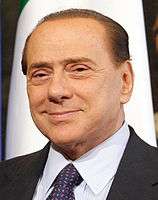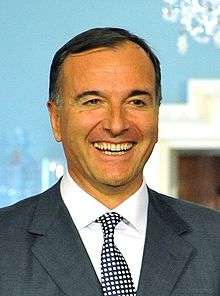Berlusconi IV Cabinet
| Fourth Berlusconi cabinet | |
|---|---|
|
60th cabinet of Italy | |
 | |
| Date formed | 8 May 2008 |
| Date dissolved |
16 November 2011 (1,287 days) |
| People and organisations | |
| Head of state | Giorgio Napolitano |
| Head of government | Silvio Berlusconi |
| Total no. of ministers | 23 |
| Member party |
The People of Freedom (PdL) Northern League (LN) Movement for Autonomy (MpA) The Populars of Italy Tomorrow (PID) since March 2011 |
| History | |
| Election(s) | 2008 election |
| Outgoing election | – |
| Legislature term(s) | 29 April 2008 - 15 March 2013 (XVI) |
| Incoming formation | Berlusconi IV Cabinet formation, 2008 |
| Outgoing formation | Monti Cabinet formation, 2011 |
| Predecessor | Prodi II Cabinet |
| Successor | Monti Cabinet |
Berlusconi IV Cabinet was the cabinet of the Italy from 8 May 2008 to 16 November 2011.
It was the fourth cabinet led by Silvio Berlusconi, the longest-serving Prime Minister of Italy of the Italian Republic (3340 days in office). It was a coalition government composed mainly of two parties, The People of Freedom (PdL) and the Northern League. Key ministers included Franco Frattini, Giulio Tremonti, Roberto Maroni and Angelino Alfano.
At its formation, the government included 22 ministers and 39 under-secretaries, for a total of 61 members. At the end of its term the cabinet was composed of 24 ministers, 4 deputy ministers and 39 under-secretaries, for a total of 67 members. With 1287 days of tenure, it was second in longevity only to Berlusconi's second government (1409 days from 2001 to 2005) in the history of the Italian Republic.
Formation
After the sudden fall of the Prodi II Cabinet on 24 January, the break-up of The Union coalition and the subsequent political crisis (which paved the way for a fresh general election on April 2008), Berlusconi, Gianfranco Fini and other party leaders finally agreed on 8 February 2008 to form a joint list named "The People of Freedom" (Italian: Il Popolo della Libertà), allied with the Northern League of Umberto Bossi and with the Sicilian Movement for Autonomy of Raffaele Lombardo.[1]
In the snap parliamentary elections held on 13/14 April 2008 this coalition won against Walter Veltroni's centre-left coalition in both houses of the Italian Parliament.
Berlusconi and his ministers (Berlusconi IV Cabinet) were sworn in on 8 May 2008.[2]
Fall

On 10 October the Chamber of Deputies rejected the law on the budget of the State proposed by the government. As a result of this event Berlusconi moved for a confidence vote in the Chamber on 14 October, he won the vote with just 316 votes to 310, minimum required to retain a majority. An increasing number of Deputies continued to cross the floor and join the opposition and on 8 November the Chamber approved the law on the budget of the State previously rejected but with only 308 votes, while opposition parties didn't participate in the vote to highlight that Berlusconi lost his majority. Among other things, his perceived failure to tackle Italy's debt crisis with an estimated debt sum of €1.9 trillion ($2.6 trillion) has urged Berlusconi to leave office. The popularity of this decision was reflected in the fact that while he was resigning crowds sang the hallelujah portion of George Frederick Handel’s "Messiah", complete with some vocal accompaniment; there was also dancing in the streets outside the Quirinal Palace, the official residence of the President of Italy, where Berlusconi went to tender his resignation.
The austerity package was passed, it will raise €59.8 billion in savings from spending cuts and tax raises, including freezing public-sector salaries until 2014 and gradually increasing the retirement age for women in the private sector from 60 in 2014 to 65 in 2026. The resignation also came at a difficult time for Berlusconi, as he was involved in numerous trials for corruption, fraud and sex offences. He was often found guilty in lower courts but used loopholes in Italy's legal system to evade incarceration.
Berlusconi had also failed to meet some of his pre-election promises and had failed to prevent economic decline and introduce serious reforms. Many believed that the problems and doubts over Berlusconi's leadership and his coalition were one of the factors that contributed to market anxieties over an imminent Italian financial disaster, which could have a potentially catastrophic effect on the 17-nation eurozone and the world economy. Many critics of Berlusconi accused him of using his power primarily to protect his own business ventures. Umberto Bossi, leader of the Lega Nord, a partner in Berlusconi's right-wing coalition, was quoted as informing reporters outside parliament, "We asked the prime minister to step aside."
CNN reported on 7 November that Berlusconi had previously denied the rumors that he was going to resign and had stated on his Facebook page that "The rumors of my resignation are groundless." On 12 November 2011, after a final meeting with his cabinet, Berlusconi met Italian president Giorgio Napolitano at the Quirinal Palace to tender his resignation. He announced this to the Italian public by telephone on one of his television channels. Italian news agency ANSA reported that Berlusconi had remarked to his aides that "This is something that deeply saddens me". Berlusconi conceded that he had lost his parliamentary majority and concluded that "things like who leads or who doesn't lead the government was less important than doing what is right for the country." Berlusconi issued a statement that he would not stand for office in Italy again after the budget defeat. In his resignation he was said to have also mentioned "eight traitors", former allies who had abstained.
Party breakdown
Party breakdown of cabinet ministers:
| 19 | |
| 3 | |
| 1 |
Composition
Prime Minister
| Office | Name | Term | Party | ||
|---|---|---|---|---|---|
 |
Ministers
References
- ↑ "Svolta di Berlusconi, arriva il Pdl: "Forza Italia-An sotto stesso simbolo"" (in Italian). La Stampa. 8 February 2008. Archived from the original on 29 October 2013.
- ↑

























